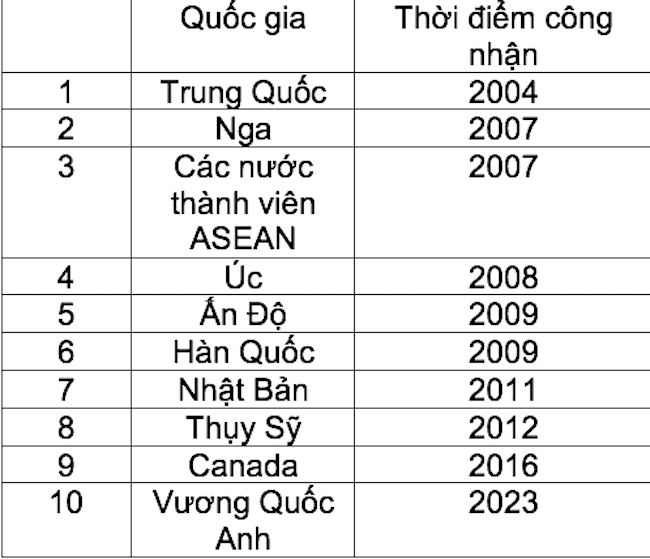The Ministry of Industry and Trade expressed its regret on August 2, 2024, as the U.S. Department of Commerce concluded its review without granting market economy status to Vietnam, despite acknowledging positive developments in the country’s economy.

Countries that recognize Vietnam as a market economy. Source: Trade Remedies Advisory Board, VCCI
According to the Ministry of Industry and Trade, “If the U.S. Department of Commerce had reviewed the dossier and Vietnam’s practices objectively and fairly, it would have acknowledged that Vietnam is already a market economy.”
As of June 2024, 72 countries recognized Vietnam as a market economy, according to the Trade Remedies Advisory Board of the Vietnam Chamber of Commerce and Industry (VCCI).
This includes major economies such as China (2004); Russia and ASEAN members (2007); Australia and New Zealand (2008); India and South Korea (2009); Japan (2011); EFTA members like Norway and Switzerland (2012); Canada (2016); and the United Kingdom (2023).
In contrast, the U.S. still considers Vietnam as one of 12 non-market economies in trade remedy cases, along with China, Russia, Belarus, Uzbekistan, Armenia, Azerbaijan, Georgia, Kyrgyz, Moldova, Tajikistan, and Turkmenistan.
Being labeled a non-market economy significantly impacts Vietnamese businesses, especially in anti-dumping investigations.
Specifically, when determining the normal value to calculate dumping margins, the U.S. uses a third country’s data, deemed a market economy (surrogate country), to compute production costs for Vietnamese enterprises instead of relying on data provided by Vietnamese companies.
This results in inflated dumping margins that do not reflect the actual production situation of Vietnamese businesses.
Additionally, treating Vietnam as a non-market economy allows the U.S. to impose a country-wide duty, a tax rate applied to companies that do not cooperate or cannot prove they are independent from government control.
Country-wide duty rates are often calculated based on available data and tend to be very high, persisting through all reviews, hindering the possibility of removing the tax.
Statistics show that the U.S. has deeply engaged in trade relations with Vietnam and benefited from trade liberalization in the past.
Removing trade barriers, especially trade remedy measures like anti-dumping and countervailing duties, would facilitate the trade of goods and services and make them more affordable.
Trade volume between the two countries is expected to increase significantly if Vietnam-U.S. trade relations are strengthened, and granting market economy status to Vietnam would be a crucial milestone.















